Eugenics Archive

Contemporary Carrie Buck?
Jan 6th
Recently, a 35-year-old woman sued a Boston-area hospital for performing a tubal ligation, thus sterilizing her, after the birth of her 9th child. Tessa Savicki states that she requested an IUD, a reversible form of birth control. Because two of her children are on welfare and she is unemployed, Tessa’s case has sparked passionate reactions and brings to mind the case of Carrie Buck.
The similarities are numerous. A poor woman sterilized against her wishes, judged by others to be unfit (just read the public comments on the news sites featuring Tessa’s story), and having children out of wedlock. There is More >
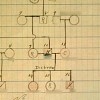
Colbert on Eugenics
Dec 3rd
Recently on The Colbert Report, in typically tongue in cheek fashion, “You-genics” was highlighted in “The Word” segment (October 28, 2009). Colbert’s discussion was tied in with our nation’s current health care debate – who is and isn’t coverable, what constitutes a pre-existing condition, and how to breed an insurable individual. Taken literally, Colbert’s words didn’t sound far off from those of proponents of the eugenics movement itself. Taken as intended, we see that a sense of humor can offer a unique perspective on anything.
Not surprisingly, eugenicists considered sense of humor as a trait to be studied, and the archive More >
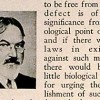
Hybrid Vigor in Corn and People
Nov 30th
The recent completion of the maize (corn) genome sequence gives us pause to think about the historical connection between agriculture and eugenics. It also causes us to consider why the leading American eugenicist, Charles Davenport, failed take greater stock in the corn research going on at one of several institutions he presided over at Cold Spring Harbor.
Especially in the United States, eugenics was firmly grounded in agriculture. Many of the leaders of the American movement had backgrounds in plant and animal breeding. For example, prior to becoming superintendent of the Eugenics Record Office (ERO) at Cold Spring Harbor, Harry Laughlin had More >
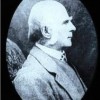
The Continuum of Eugenics Practice
Oct 22nd
Francis Galton, the English scientist who coined the term, defined eugenics as “the agencies under social control that improve or impair the racial qualities of future generations either physically or mentally.” Charles Davenport, the father of the American eugenics movement called it simply “the self direction of human evolution.”
These definitions stress differences that occupied either end of a continuum of eugenics practice. At one end, Galton’s definition stressed social control, or laws, to control human reproduction. At the other end, Charles Davenport’s stressed an individual’s own control over their reproduction. Social control ultimately embodied “negative eugenics”– limiting mixed race marriages, More >
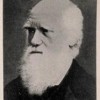
Eugenics Archive Extremes
Oct 8th
The Nobel announcements always get people buzzing here at CSHL. This week was particularly exciting because Carol Greider, one of the Physiology or Medicine winners, graced the Lab campus for some years. As another example of science leaked into the mainstream, I learned about a NOVA dramatization on Charles Darwin, as well as a theatrical movie that initially didn’t make it to the US due to its controversial inclusion of the creationism debate.
As someone who only has one foot in this science world, I’ve wondered how those outside it look on at the celebrations and science story telling. Do they More >

Twin Studies
Sep 24th
Eugenicists studied twins to explore genetic and environmental influences on human behavior. Twins, some raised separate from one another, were tested intellectually and measured physically. Eugenicists were looking to prove that heredity determines everything about an individual. They examined fingerprints, hair and eye color, temperament, memory, measured every body part, and even asked subjects how they liked their eggs and steak prepared.
The Archive includes several images from twin studies performed by Otmar Freiherr von Verschuer at the Institute of Hereditary Biology and Race Biology at the University of Frankfurt. These studies were horrifically taken to an extreme by the Nazis in More >
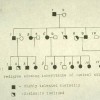
It’s All Your Parents’ Fault
Sep 15th
Eugenicists looked at a diversity of “traits” and asserted that many of them were genetically inherited, excluding any other cause. The subjects of the studies often came from unique populations, including circus performers, residents in mental institutions, and even historical figures, long deceased.
A quick search in the Eugenics Archive reveals some of the traits studied by Eugenicists:
Civic leadership Musical ability Dressmaking Epilepsy Dwarfism Giantism Carpentry Deafness Eye color Insanity Longevity Shiftlessness Cancer Blindness Albinism Hemophilia Boat building Degeneracy Poverty Feeblemindedness Cleft palate Hare lip Manic depression Hair color, texture Polydactyly Height Literary ability Inventiveness Color blindness Mechanical skill Artistic ability More >
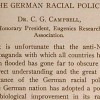
Health Care and Eugenics
Jul 16th
Health care is the burning topic these days. Accusations are flying against government initiatives including terms like sterilization, Nazi, and eugenics.
Are these fair characterizations? Decide for yourself by exploring several topic areas in the Eugenics Archive that may sound as if they were discussed at the latest town hall meeting: Birth and Population Control, German/Nazi Eugenics, and Sterilization Laws. Once in the Archive, choose to browse by topic to read the topic essays and view the associated images.
